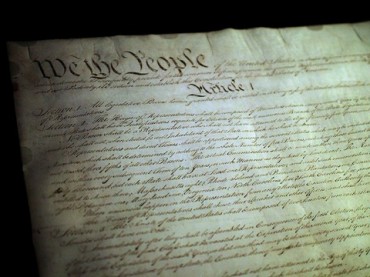
Critic: ‘Seminal documents’ missing from framework; mentions Black Panthers but not Dr. Martin Luther King Jr.; defines Manifest Destiny as ‘built on a belief in white racial superiority’
A controversial new curriculum framework for high school educators who teach college-prep history that’s been accused of maligning and denigrating America’s past has prompted a series of back-and-forth accusations between its leading critics and developers, a debate that’s unfolding as conservatives push to have the revisions shelved or revamped.
The latest volley came by way of Larry Krieger, a retired AP U.S. History teacher from Pennsylvania and an outspoken critic of the new Advanced Placement framework, who said its developers are disingenuous when they suggest educators can and still will teach on subjects not listed in the document.
“Seminal documents” missing from the new framework include: the Mayflower Compact; Northwest Ordinance; Federalist Paper No. 10; Frederick Douglass’s Independence Day speech; Alexis de Tocqueville—excerpts from Democracy in America; Lincoln’s Gettysburg Address; John F. Kennedy’s inaugural address; and Dr. Martin Luther King Jr.’s “I Have a Dream” speech.
Even more alarming is how Manifest Destiny – the idea that U.S. power in the Western Hemisphere should expand farther westward – is depicted as “built on a belief in white racial superiority and a sense of American cultural superiority,” according to Krieger.
He notes Manifest Destiny in the past had always been taught to students as an expression of America’s interest in spreading democracy, freedom, and new technology across the continent.
“Neither the College Board nor the Open Letter authors have explained why the Framework does have space to include Chief Little Turtle, the Students for a Democratic Society, and the Black Panthers, but does not have space to include Dwight Eisenhower, Jonas Salk, and Martin Luther King Jr.,” Krieger writes in his latest criticism of the framework.
The “Open Letter” Krieger refers to was penned recently by members of the curriculum development and reassessment committee for the new AP U.S. History framework, who charged that criticisms of the revamp have “a very limited faith in history teachers’ command of their subject matter.”
For example, they say it is not necessary to identify Martin Luther King, Jr. as a post-war civil rights activist, based on feedback they received from AP teachers.
“Any United States History course would of course include King as well as most other major figures such as Benjamin Franklin and Dwight Eisenhower,” the letter reads.
They say these names were not even in the previous framework, simply because teachers had “always understood the need to teach them.”
But Krieger, in response to the open letter, refuted the claim, saying the framework states unequivocally that no future AP U.S. History exams will be required to know any content that is not mentioned in the framework itself. This is important, he says, because students who do well on the AP U.S. History exam receive college credit — up to six at some universities.
Passing the exam and earning the college credit is the motivation for enrolling in AP classes for most high school students, so students want to focus their class time on what will be on the test.
Krieger also lists 29 “biased statements” in the framework.
Notable ones include how the British colonists supposedly believed in “white superiority to justify their subjugation of Africans and American Indians,” and how the British enslaved black people due to their “strong belief in British racial and cultural superiority.”
In addition, Krieger says there is only a quick reference to George Washington in which the authors of the framework simply note his famous warnings in his Farewell Address.
“This revisionist definition clearly expresses the Framework’s negative biases,” Krieger wrote.
He also says the framework portrays capitalism in a negative light, since it highlights criticisms of the “dominant corporate ethic in the United States and sometimes capitalism itself, offering alternate visions of the good society through utopianism and the Social Gospel.”
World War II is only covered in two sentences, Krieger adds, while Abraham Lincoln’s Gettysburg Address is nowhere to be found.
Although the authors of the open letter express their hope that the controversy is now over, Krieger says their letter “fails to fully and forthrightly address the central issues raised” in the framework.
He calls on the College Board to delay the implementation of the new framework, and to stick with the previous course for at least a year while “a new and more inclusive committee” has the opportunity to create a more “balanced” curriculum that “reflects America’s guiding principles and traditions.”
College Fix reporter Andrew Desiderio is a student at The George Washington University.
Like The College Fix on Facebook / Follow us on Twitter





Please join the conversation about our stories on Facebook, Twitter, Instagram, Reddit, MeWe, Rumble, Gab, Minds and Gettr.